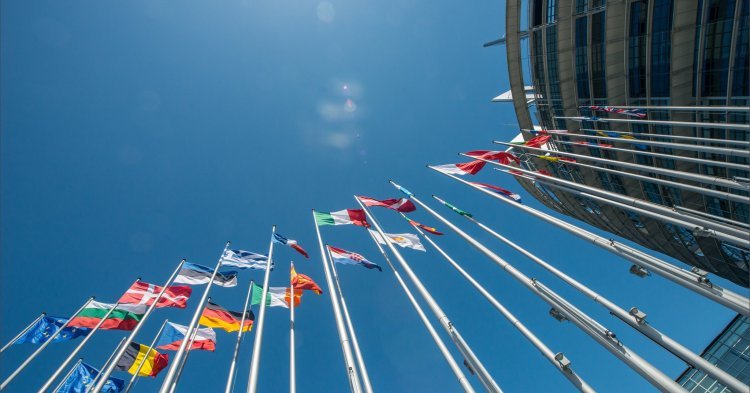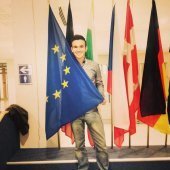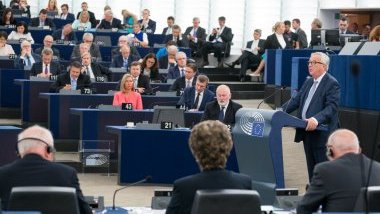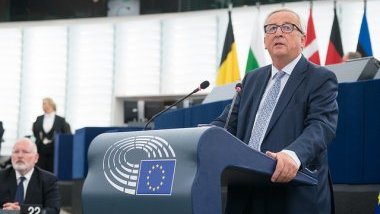Radu Dumitrescu, Editor-in-Chief of The New Federalist: Let us show the European Union more respect
In his State of the Union speech, Commission President Jean-Claude Juncker stood before the whole continent and underscored the Union’s past and present, but he paid special attention to its future. He vowed that Europe will always be a “guardian of peace” whose rallying cry is eternally “never again war”.
Juncker also presented the Union’s economic feats – growth for 21 consecutive quarters, 12 million new jobs, youth unemployment lowest since 2000, Greece out of crisis, trade agreements with 70 countries and remaining the world’s biggest single market – but it wasn’t his promises of the future or his listing of the feats of the present that stood out from his speech. It was his demands. The first, “let us show the European Union a bit more respect.”
The European Union demands respect. Not by the force of arms, not through bombs or threats, but through its efforts. The Union, through Juncker, demands respect from its citizens, whom it vows to protect from fake news, poverty, abuses, disease and external threats, but also from its partners – the expansive Russia and the recalcitrant, Trump-led United States. To that point, the president of the Commission mentioned the impeding massacre at Idlib, the push towards integration in the Western Balkans and the increased partnership between Africa and Europe.
The Union also demands respect from its Member States, as Juncker stated “I will continue to resist all attempts to blame the Commission alone. There are scapegoats to be found in all three institutions – with the fewest in Commission and Parliament”, thus leaving the Council unnamed. The euro, “now 20 years young” and “the second most used currency in the world”, must also find its place on the international scene.
Together, Europe can “reach for the stars”, through its Galileo Programme. Divided into North and South, East and West, left and right, it remains grounded, small, a union of petty states seeking advantages. However, sometimes small differences between me and my neighbor are much more visible than the stars.
Nico Amiri, Editor-in-Chief of euro-journal.nl
He is a political President: a truly convinced European with conservative heritage, but with progressive ideas. Jean-Claude Juncker always told his audience what he had been thinking about the European idea, the European Union and its condition.
In last year’s SOTEU, he said that the wind would be back in Europe’s sails. He was right but the European institutions did not use the time to make the European Union more stable against any crisis.
This time, he made clear that his successor has to work on the proposals the current Commission is still working on. The euro has to strengthen, the foreign policy has to be harmonised and the democracy has to be developed within the system of the EU. Juncker clearly showed his visions, the next President has to work on that. She or he has to be even more political.
Hopefully, the next SOTEU will look back on months of success in the summer of 2019 - after an election, which could be a momentum for European democracy.
Gesine Weber, Editor-in-Chief of treffpunkteuropa.de
Jean-Claude Juncker was always good at making Europeans’ hearts beat a little bit faster. Among many bureaucrats in the EU’s capital, he always proved a dreamer who never lost hope, who believed in the European idea, despite all crisis and populists and criticism. With his last State of the Union address, he did it again. This year’s speech was a love declaration to the EU, it was passionate, and the whole speech reflected what Juncker said in the end: “I love Europe still and shall do so forever more.”
The content of the speech was, to be honest, less innovative than it could have been: it was not surprising that Juncker spoke about “Weltpolitikfähigkeit”, the capacity to play a role in world politics, in these days were Europe is hit by the impact of globalisation more than ever before. However, it was not necessary to come up with new fancy tools or ideas in this speech; it was important to bring up proposals that frame the discourse and that might be taken up by decision-makers now and during the electoral campaigns.
Juncker did the absolutely right thing, and that was focusing on the year - or rather the eight months - to come instead of praising himself and his commission to the skies. EU first, ego second: this is a commendable attitude. However, Juncker is fully aware that the EU needs to deliver results, and, at the long-term, reforms - not to secure Juncker’s place in history books, but to succeed and maybe even to survive. Despite a hesitating Merkel and a Macron in domestic troubles, he can count on the French-German couple to share his concerns and, for the most part, his visions. This speech was not a farewell, it was a clear announcement: Juncker wants to get things done. Let’s hope he’ll succeed.
You may find Juncker’s full speech here.






Follow the comments: |
|
